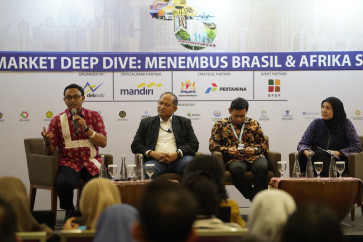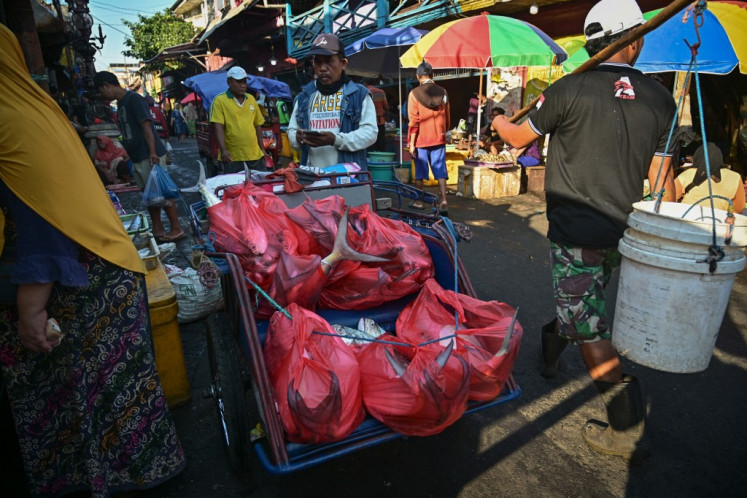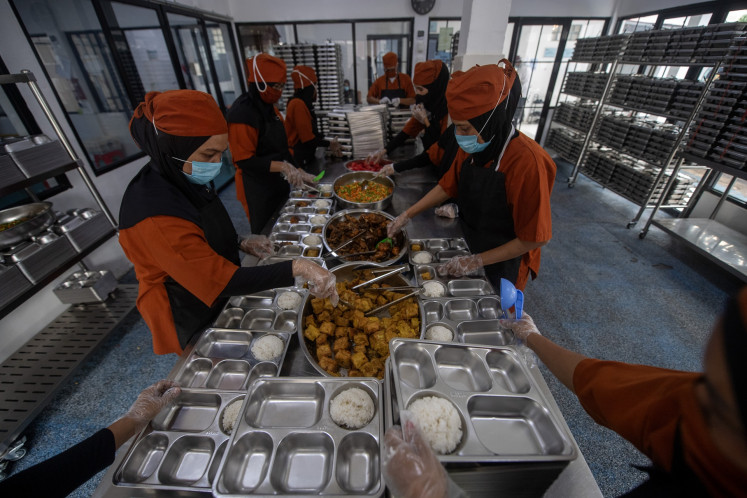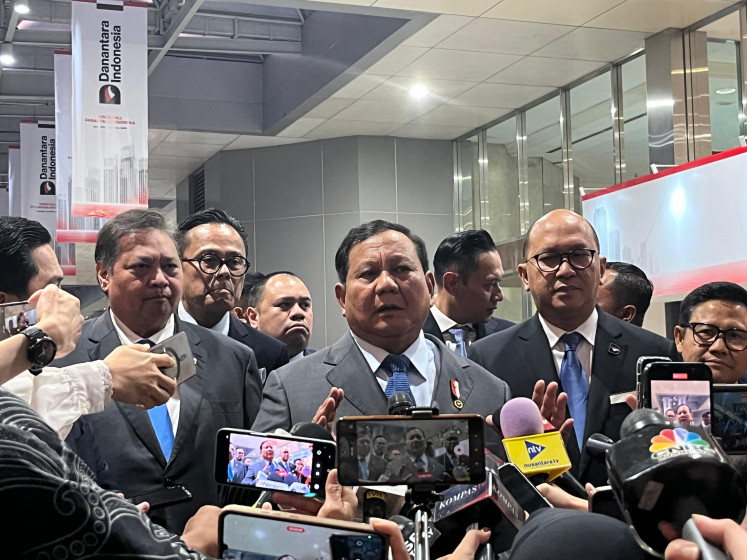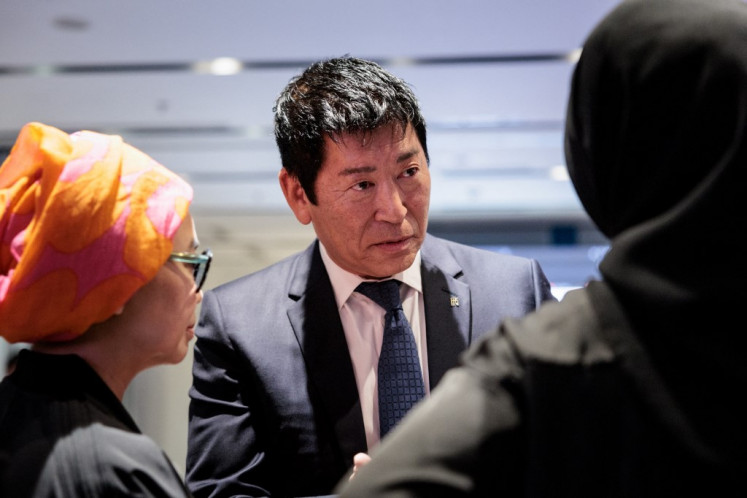Popular Reads
Top Results
Can't find what you're looking for?
View all search resultsPopular Reads
Top Results
Can't find what you're looking for?
View all search resultsMalaysia confronts the realities of MAGA diplomacy
For decades, Malaysia and the US have enjoyed a mutually beneficial relationship. Could that be changing?
Change text size
Gift Premium Articles
to Anyone
U
nited States President Donald Trump’s pick for the US’s next ambassador to Malaysia has raised more than a few eyebrows in the Southeast Asian nation. Right-wing influencer Nick Adams, a naturalized American born and raised in Australia, is, by his own account, a weightlifting, Bible-reading, “wildly successful” and “extremely charismatic” fan of Hooters and rare steaks, with the “physique of a Greek God” and “an IQ over 180.”
Such brashness seems at odds with the usually quieter business of diplomacy. The same could be said about Adams’ lack of relevant experience, temperament and expressed opinions – which clash starkly with prevailing sentiment in majority-Muslim, socially conservative Malaysia.
Adams is most definitely a “political” nominee. His prior public service, as councilor, then deputy mayor, of a Sydney suburb ended abruptly in 2009 amid displays of undiplomatic temper. Yet far more problematic for his new posting is his past perceived disparaging of Islam and ardent pro-Israel views.
Whether or not Malaysia would officially reject his appointment, assuming Adams is confirmed, remains uncertain, notwithstanding strong domestic pressure on Prime Minister Anwar Ibrahim to do so.
But regardless, the nomination marks a turning point in US-Malaysian diplomatic relations. In my view, it communicates an overt US disregard for diplomatic norms, such as the signaling of respect and consideration for a partner state.
It also reflects the decline in a relationship that for decades had been overwhelmingly stable and amicable. And all this may play into the hands of China, Washington’s main rival for influence in Southeast Asia.
The US and Malaysia have largely enjoyed warm relations over the years, notwithstanding occasional rhetorical grandstanding, especially on the part of former longtime Prime Minister Mahathir Mohamad.
Having successfully battled a communist insurgency during the mid-20th century, Malaysia remained reliably anti-communist throughout the Cold War, much to Washington’s liking.
Malaysia also occupies a strategically important position along the Strait of Malacca and has been an important source of both raw materials such as rubber and for the manufacturing of everything from latex gloves to semiconductors.
In return, Malaysia has benefited both from the US security umbrella and robust trade and investment.
But even before Trump’s announcement of his ambassadorship pick, bilateral relations were tense.
The most immediate cause was tariffs. In April, the US announced a tariff rate for Malaysia of 24 percent. Despite efforts to negotiate, the Trump administration indicated the rate would increase further to 25 percent should no deal materialize by Aug. 1. That the White House released its revised tariff rate just two days before announcing Adams’ nomination only added to Malaysia’s grievance.
Malaysia may reap some benefit from the new US trade policy, should Trump’s broader agenda result in supply chains bypassing China in favor of Southeast Asia, and if investors seek new outlets amid Trump’s targeted feuds. But Malaysia’s roughly US$25 billion trade surplus with the US, its preference for “low-profile functionality” in regard to its relationship with the US and the general volatility of economic conditions leave Malaysia vulnerable.
Moreover, trade policy sticking points for the US include areas where Malaysia is loath to bend, such as in its convoluted regulations for halal certification and preferential policies favoring the Malay majority that have long hindered trade negotiations between the two countries.
The punishing tariffs the White House has threatened leave Malaysia in a bind. The US is Malaysia’s biggest investor and lags behind only China and Singapore in volume of trade. As such, the government in Kuala Lumpur may have little choice but to sacrifice domestic approval for economic expediency.
Nor is trade the only source of angst. The White House’s pressure on American institutions of higher education is affecting collateral damage on a host of its ostensible allies, Malaysia included. Although numbers have declined since the Asian financial crisis of the late 1990s, the US has remained a popular destination for Malaysians seeking education abroad.
In the 1980s, over 10,000 Malaysians enrolled in US colleges and universities annually. Prior to the COVID-19 pandemic, numbers stabilized at around 8,000. But after, enrollments struggled to recover – reaching only 5,223 in 2024. Now, they are falling again.
In the first Trump administration, the visa approval rate for Malaysian students remained high despite Trump’s “Muslim ban” exacerbating impressions of an unwelcoming environment or difficult process.
Now, economic uncertainty from trade wars and a struggling Malaysian currency, coupled with proliferating alternatives, make the comparatively high expense of studying in the US even more of a deterrent.
Yet what propelled Anwar’s administration to announce that it will no longer send government-funded scholarship students to the US – a key conduit for top students to pursue degrees overseas – was specifically the risks inherent in Trump’s policies, including threats to bar foreign students at certain universities and stepped-up social media screening of visa applicants.
Clearly, Malaysia’s government believes that deteriorating relations with the US are not in its best interests. Yet as the junior partner in the relationship, Malaysia has limited ability to improve them.
In that, Kuala Lumpur has found itself in a similar boat to other countries in the region who are likewise reconsidering their strategic relationships with the US amid Trump 2.0’s dramatic reconfiguration of American foreign policy priorities.
When sparring with China for influence in Southeast Asia, the US has, until recently, propounded norms of a Western-centric “liberal international order” in the region – promoting such values as openness to trade and investment, secure sovereignty and respect for international law.
Malaysia has accepted, and benefited from, that framework, even as it has pushed back against US positions on the Middle East and, in the past, on issues related to human rights and civil liberties.
But amid the Trump administration’s unpredictability in upholding this status quo, a small, middle-income state like Malaysia may have little option beyond pursuing a more determinedly nonaligned neutrality and strategic pragmatism.
Indeed, as the US sheds its focus on such priorities as democracy and human rights, China’s proffered “community with a shared future,” emphasizing common interests and a harmonious neighborhood, cannot help but seem more appealing.
This is true even while Malaysia recognizes the limitations to China’s approach, too, and resists being pushed to “pick sides.” Malaysia is, after all, loath to be part of a sphere of influence dominated by China, especially amid ongoing antagonism over China’s claims in the South China Sea – something that drives Malaysia and fellow counterclaimants in Southeast Asia toward security cooperation with the US.
That said, Anwar’s administration seemed already to be drifting toward China and away from the West even before the latest unfriendly developments emanating from Washington. This includes the announcement in June 2024 of its plan to join the BRICS economic bloc of low- and middle-income nations.
Now, the more bridges the US burns, the less of a path it leaves back to the heady aspirations of the first Trump administration’s “Free and Open Indo-Pacific” framework, which had highlighted the mutual benefit it enjoyed and shared principles it held with allies in Asia.
Instead, Malaysia’s plight exemplifies what a baldly transactional and one-sided approach produces in practice.
As one ruling-coalition member of parliament recently described, Adams would be the rare US ambassador with whom Malaysian politicians would be loath to pose for photos. And that fact alone speaks volumes about diplomacy and evolving global strategic realities in the MAGA era.
---
The writer is a professor of political science at University at Albany, State University of New York. The article is republished under a Creative Commons license. The views expressed are personal.




